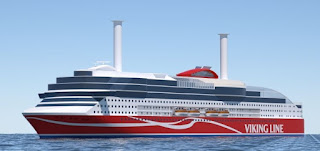Wärtsilä clinches smart ferry contract
Wärtsilä Corp will deliver its latest bridge and prediction software to a ferry being built in China. Wärtsilä has won a contract to provide navigation, ship intelligence, propulsion, dual-fuel engines and a ballast water management system to a ferry being built by Xiamen Shipbuilding Industry for Finland-based operator, Viking Line.
Viking’s newbuild ferry bridge will have a Nacos Platinum integrated navigation system that will enable the ship to be navigated, controlled, and monitored from several work stations. It will include radar, ECDIS, conning, propulsion controls and communications.
Also included in the bridge system will be a version of Wärtsilä SmartPredict, which provides officers with information to improve ship safety and manoeuvring. This predicts a vessel’s future position and heading based on environmental and system information.
Wärtsilä SmartPredict evaluates the wind and sea forces affecting the vessel to provide advanced motion prediction on a configurable display on the bridge.
The propulsion controls will be used to manage bow thrusters and six Wärtsilä 31DF dual-fuel engines that will operate primarily on liquefied natural gas (LNG). Wärtsilä will also supply the LNG fuel storage and supply system and an advanced compact silencer.
This newbuild ferry is due to enter service early in 2021 on routes across the Baltic Sea between Turku, Finland and Stockholm, Sweden


Comments
Post a Comment